Related Research Articles

Hubert Fauntleroy Julian was a Trinidad-born American aviation pioneer. He was nicknamed "the Black Eagle".

Oscar Devereaux Micheaux (; was an American author, film director and independent producer of more than 44 films. Although the short-lived Lincoln Motion Picture Company was the first movie company owned and controlled by black filmmakers, Micheaux is regarded as the first major African-American feature filmmaker, a prominent producer of race films, and has been described as "the most successful African-American filmmaker of the first half of the 20th century". He produced both silent films and sound films.

Biograph Studios was an early film studio and laboratory complex, built in 1912 by the Biograph Company at 807 East 175th Street, in The Bronx, New York City, New York.
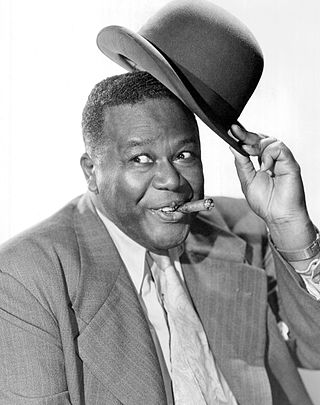
Spencer Williams was an American actor and filmmaker. He portrayed Andy on TV's The Amos 'n' Andy Show and directed films including the 1941 race film The Blood of Jesus. Williams was a pioneering African-American film producer and director.
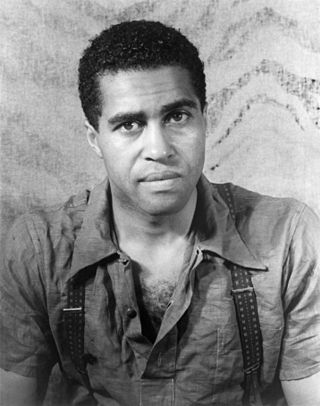
Robert Earl Jones, sometimes credited as Earl Jones, was an American actor and professional boxer. One of the first prominent black film stars, Jones was a living link with the Harlem Renaissance of the 1920s and 1930s, having worked with Langston Hughes early in his career.

Juano G. Hernández was a Puerto Rican stage and film actor who was a pioneer in the African American film industry. He made his silent picture debut in The Life of General Villa, and talking picture debut in an Oscar Micheaux film, The Girl from Chicago, which was directed at black audiences. Hernández also performed in a series of dramatic roles in mainstream Hollywood movies. His participation in the film Intruder in the Dust (1949) earned him a Golden Globe Award nomination for "New Star of the Year." Later in life he returned to Puerto Rico, where he intended to make a film based on the life of Sixto Escobar.

The race film or race movie was a genre of film produced in the United States between about 1915 and the early 1950s, consisting of films produced for black audiences, and featuring black casts. Approximately five hundred race films were produced. Of these, fewer than one hundred remain. Because race films were produced outside the Hollywood studio system, they were largely forgotten by mainstream film historians until they resurfaced in the 1980s on the BET cable network. In their day, race films were very popular among African-American theatergoers. Their influence continues to be felt in cinema and television marketed to African-Americans.
The Black Filmmakers Hall of Fame, Inc. (BFHFI), was founded in 1974, in Oakland, California. It supported and promoted black filmmaking, and preserved the contributions by African-American artists both before and behind the camera. It also sponsored advance screenings of films by and about people of African descent and hosted the Oscar Micheaux Awards Ceremony, held each February, from 1974 to 1993, in Oakland.

Edna Mae Harris, sometimes credited as Edna May Harris was an American actress and singer. Harris, an African–American, was film actress in the late 1930s and early 1940s, appearing in films featuring mostly African–American casts.
Midnight Ramble is a 1994 documentary about the early history of Black American movies from the period between 1910 and 1950. Known as "race movies", these films, traditionally independent of Hollywood, were made primarily by, for and about the black community. This documentary is a tribute to a film genre that lasted for more than 40 years, produced over 500 movies, and created a foundation for contemporary films from directors such as Spike Lee and Tyler Perry. James Avery narrates this exploration of the early black film industry. There is a mistaken assumption that "race films" began largely in reaction to D. W. Griffith's 1915 The Birth of a Nation. Nothing could be further from the truth. Race movies actually began around 1910 in Chicago in response to the Black Community longing to see themselves reflected on the silver screen via this new medium of film. Wanting to see themselves through their own eyes, on their own terms thus counteracting the Hollywood stereotypes within the American media.
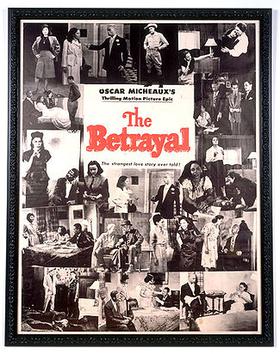
The Betrayal is a 1948 American race film written, produced, and directed by Oscar Micheaux. He adapted it from his 1943 novel The Wind From Nowhere.
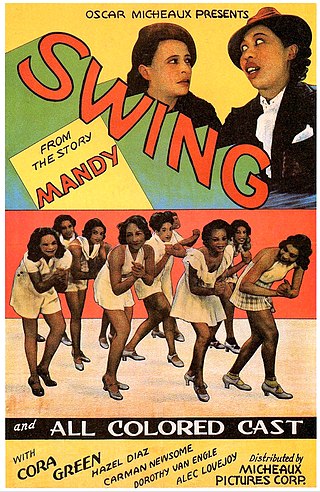
Swing! is a 1938 American race film directed, produced and written by Oscar Micheaux.
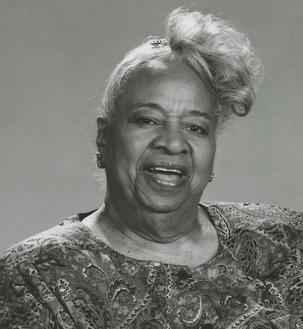
Frances Elizabeth Williams was an American actress, activist, theatre producer, organizer, and community worker. Williams was the first black woman to run for the California State Assembly in 1948 on the Progressive Ticket and served on the boards of the Screen Actors Guild, Actors' Lab, and Actors Equity. She represented the World Peace Council at the first Angola Independence Celebration in 1975, and co-founded the Art Against Apartheid Movement in Los Angeles in the 1980s.
The Czar of Black Hollywood is a 2014 documentary film by Bayer Mack that chronicles the early life and career of African-American filmmaker Oscar Micheaux (1884–1951). Mack conceived of and produced the film about Micheaux using Library of Congress archived footage, photos, illustrations and vintage music. The documentary, which is the first devoted exclusively to Oscar Micheaux's life, is narrated by William Bell, features an original score by Nicholas Jones and art direction by Julie Anderson.
Pearl Bowser was an American author, collector, television director, film scholar, film director, producer, filmmaker, independent distributor and film archivist. Along with her peers Mel Roman and Charles Hobson, Bowser researched and curated "The Black Film" retrospective at the Jewish Museum in 1970. This prompted a new wave of public interest into "exhibiting, producing, and engaging with African American cinema beyond borders". Most of her exalted career was spent traveling the globe in order to cultivate audiences for marginalized filmmakers. An example of her efforts, and also her most groundbreaking work, manifested in her research on "early-1900s Black film pioneer Oscar Micheaux". This research can be seen in her book on the first ten years of the career of Oscar Micheaux, an African-American who directed 40 "race pictures" between 1918 and 1940. She is thus credited for having helped rediscover some of Oscar Micheaux's rare surviving films. She is the founder of African Diaspora Images, a collection of visual and oral histories that documents the history of African-American filmmaking. Part of her journey included teaching young people film in the 1960s and 1970s.
Ethel Moses was an American stage and film actress, and dancer. She was billed as "the black Jean Harlow". Moses is best known for working in films by Oscar Micheaux.
Easy Street is a 1930 American film by Oscar Micheaux, an African American filmmaker. It features an African American cast. Known as the last silent achievement in his filmography, the film is considered lost. The plot reportedly revolved around a group of con artists trying to seize the savings of an old man.

African American cinema is loosely classified as films made by, for, or about Black Americans. Historically, African American films have been made with African-American casts and marketed to African-American audiences. The production team and director were sometimes also African American. More recently, Black films featuring multicultural casts aimed at multicultural audiences have also included American Blackness as an essential aspect of the storyline.
Carman Newsome was an African-American actor, musician and band conductor in the United States. His work includes leading roles in five Oscar Micheaux films.
Alfred N. Sack was an American businessperson, newspaper publisher and the proprietor of film distribution, production, and the theater-owning business Sack Amusements in the United States.. He collaborated with Spencer Williams to make films with Black casts. Sack Amusement Enterprises was the leading distributor of this type of film between 1920 and 1950.
References
- ↑ Gevinson, Alan, Within Our Gates, American Film Institute.
- 1 2 "Hollywood in the Bronx", Time Magazine, January 29, 1940.
- ↑ "The Notorious Elinor Lee", Turner Classic Movies.
- ↑ Kaplan Gubert, Betty, Miriam Sawyer and Caroline M. Fannin, Distinguished African Americans in Aviation and Space Science, Oryyx Press, 2002.
- ↑ Cripps, Thomas, Slow Fade to Black: The Negro in American Film, 1900–1942, Oxford University Press, 1993.
- ↑ "Oscar Micheaux Biography" Archived 2008-10-20 at the Wayback Machine , Producers Guild of America.